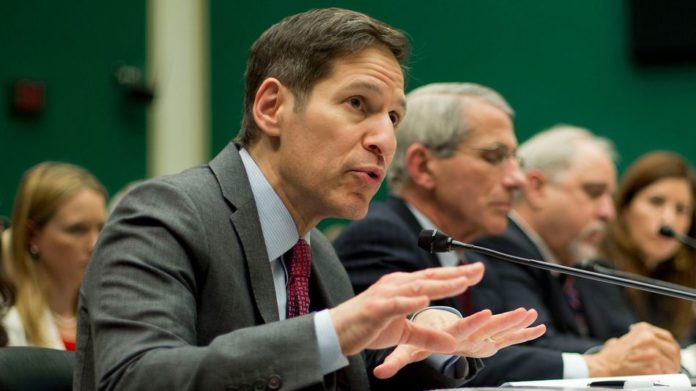 CDC Director Dr. Tom Frieden testifies on Capitol Hill in Washington, Thursday, Oct. 16, 2014.
CDC Director Dr. Tom Frieden testifies on Capitol Hill in Washington, Thursday, Oct. 16, 2014.
Federal health officials questioned whether the U.S. is prepared to stop the deadly Ebola virus and criticized the nation’s response during a hearing on Capitol Hill Thursday.
“People are scared,” said Rep. Fred Upton, R-Mich., chairman of the Energy and Commerce Committee. “People’s lives are at stake, and the response so far has been unacceptable.”
Below are the highlights from the hearing.

Centers for Disease Control and Prevention (CDC) Director Dr. Tom Frieden, left, prepares to testify on Capitol Hill in Washington, Thursday, Oct. 16, 2014.
Image: Pablo Martinez Monsivais/Associated Press
Ebola-stricken nurse in Texas to be transferred to Maryland
Federal health officials said Thursday they still don’t know how two Dallas nurses caught Ebola from a patient. Now, one of nurses will be transferred to the National Institutes of Health outside of Washington on Thursday.
Nina Pham, who was being treated in Dallas, will move to the Maryland facility’s isolation unit. Pham, who contracted Ebola while treating Thomas Eric Duncan, will be transferred on Thursday evening, said Dr. Anthony Fauci, director of the National Institute for Allergy and Infectious Diseases at the National Institute of Health.

26-year-old nurse Nina Pham was identified as the Dallas healthcare worker with Ebola, on Monday, Oct. 13, 2014.
During the hearing, the Texas Health Presbyterian Hospital Dallas came under fire for failure to meet adequate standards to protect staff from contracting the deadly disease.
“We need to commit adequate funding to public health infrastructure. Based on what we know, it appears Texas Presbyterian would have not met those standards,” said Rep. Henry Waxman of California. “Though in fairness I suspect that many hospitals across the country would not be prepared to respond.”
During the hearing, Dr. Daniel Vargas of Texas Presbyterian Health admitted that the hospital had made mistakes during their treatment of Duncan. For his part, Dr. Thomas Frieden, director of the Center for Disease Control and Prevention, acknowledged that the hospital is dealing with “a difficult situation.”
“They are now dealing with at least 50 health care workers who may have been exposed,” Frieden said.
The CDC is still not specifying how the healthcare workers contracted the disease, but Frieden has said the investigation is ongoing and possible causes have been identified.
Travel ban may not be off the table
The Ebola outbreak has spun out of control in three countries in West Africa, where more than 4,000 people have died from the virus. Now, some lawmakers have raised the question of imposing a travel ban for those coming from Sierra Leone, Guinea and Liberia.
“There are no shortcuts in the control of Ebola, and it is not easy to control it. To protect the United States we need to stop it at its source,” Frieden said.
Although the administration opposes a travel ban, Frieden didn’t completely dismiss the possibility when pressed about it. However, he noted that many of the people coming to the U.S. from West Africa are American citizens. “So that is one issue to be aware of,” he said.
Louisiana Congressman Steve Scalise asked Frieden point-blank several times if he had discussed a travel ban with the White House in any capacity. Frieden side-stepped the question several times, saying the White House “will certainly consider anything that would reduce risk to Americans.”
Frieden and Fauci said that such an approach would not be effective because it would just push people to travel to the U.S. via more circuitous routes that couldn’t be traced, and would hamper efforts to keep tabs on those arriving. The solution, they said, is to control the outbreak in West Africa.
“One of the things I fear about Ebola is that it could spread more widely in Africa,” said Frieden. “If this were to happen it could become a threat to our health system and the health care we give for a long time to come.”
However, Frieden was met with harsh questions from the GOP, including Upton, who said up to 150 people come to the U.S. daily from “hot zones” in Africa.

“You’re right, it needs to be solved in Africa. But until it is we should not be allowing these folks in, period,” Upton told Frieden.
“We will consider any options to better protect Americans,” Frieden said.
When House members began questioning the CDC director about Americans’ fears concerning the virus, Frieden said he was certain that “there will not be a large outbreak in the U.S.”
Regarding U.S. troops currently on the ground in West Africa, Frieden said they weren’t completely safe, but their plans don’t include care or direct contact with Ebola patients.
“That said, we would always be careful because there is always the possibility to come into contact with [someone with symptoms],” Frieden said, adding that some locations now have hand-washing stations and have added other precautions.
At least 3,000 U.S. Army personnel were sent to West Africa to help combat Ebola.
[embedded content]
Travel ban for dogs? Some elected officials want it
During the hearing, questions came up in regards to the transmission of Ebola from dogs to human, as well as the ability for a dog to contract the virus.
Frieden emphasized that there has been no documented transmission of the Ebola outbreak from dogs to humans. However one representative, Morgan Griffith of Virginia, asked Frieden if he believed travel restrictions needed to be put in place for dogs.
Kudos to CDC’s Tom Friedan for keeping a straight face when grilled by Rep. Morgan Griffith on the looming threat of “traveling dogs.”
— Alex Wagner (@alexwagner) October 16, 2014
Some information in this report was provided by the Associated Press.
